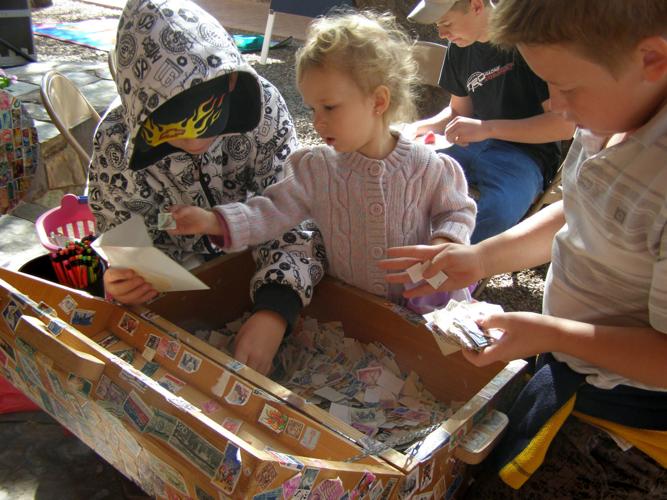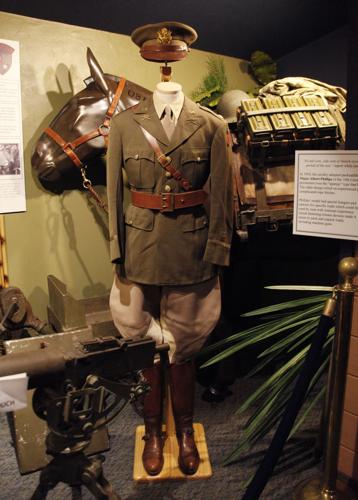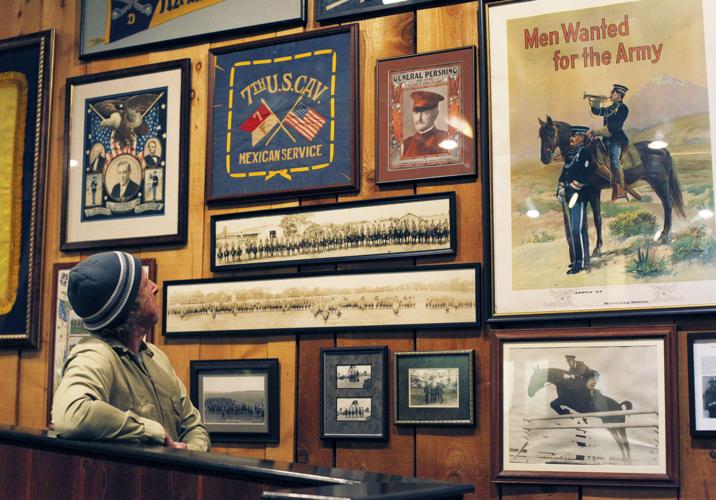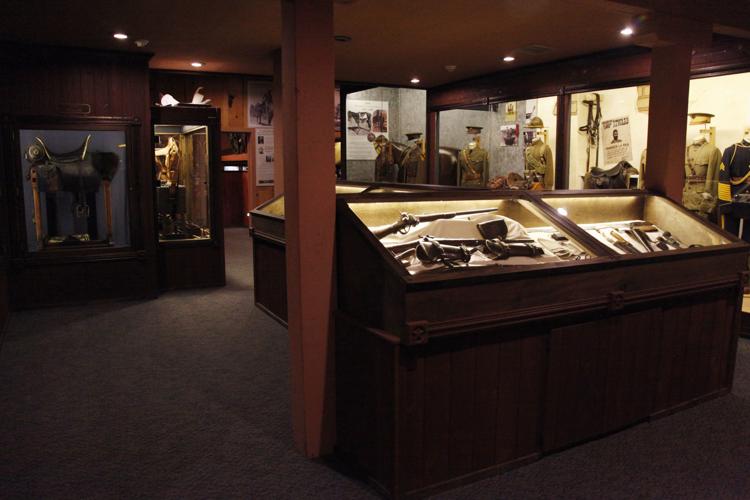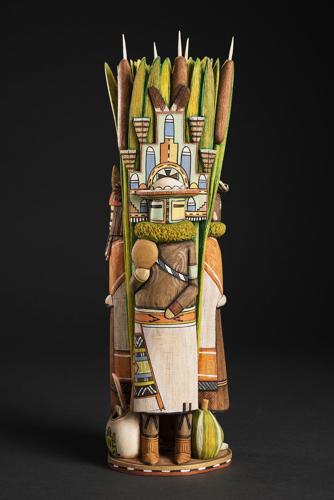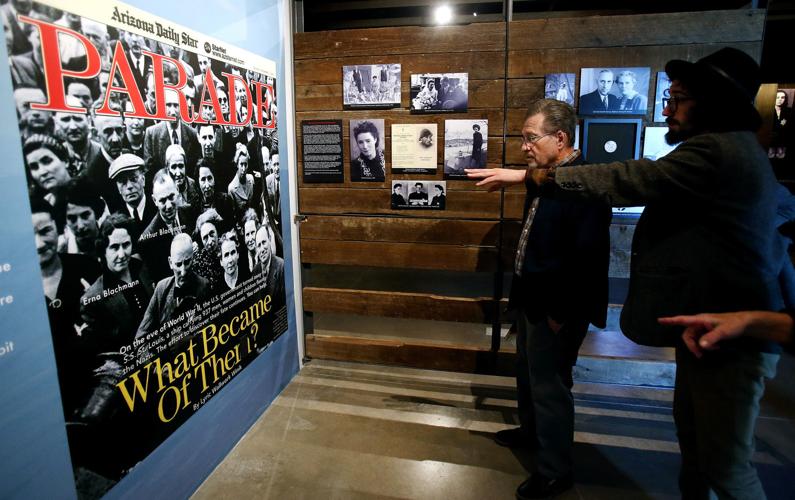Stepping into an 1895 post office, learning about a horse with a military rank and delving into a murder mystery are just three unexpected discoveries at Tucson-area museums that are dedicated to the people, events and cultures of the past.
Context-rich museums, many housed in historic buildings, offer distinct pieces that create an overarching picture of Tucson’s history. This is the final installation of a two-part series exploring some of these pieces.
Arizona State Museum
About 13,000 years ago, well before 1775 when Spanish soldiers founded Presidio San Augustin del Tucson, ancient indigenous and native cultures lived in the Tucson region.
The Arizona State Museum, 1013 E. University Blvd., on the University of Arizona campus, northeast of the Main Gate, is the oldest and largest anthropological research museum in the Southwest. Established in 1893, its collections and resources are dedicated to teaching and studying this period in human history in the region, says Darlene F. Lizarraga, the museum’s director of marketing.
Lizarraga says the museum’s collection of 3 million cataloged objects include: 500,000 photographic negatives and original prints; 300,000 archaeological artifacts; 100,000 books and journal issues; the world’s largest and most comprehensive collection of Southwest Indian pottery (24,000 whole vessels spanning 2,000 years); and the world’s largest and most comprehensive collection of American Indian basketry (35,000 woven objects spanning 8,000 years).
“One World, Many Voices,” which is on display through March 2019, is a traveling exhibit, produced by Canyon Records, a Grammy Award-winning label specializing in Native American music. The exhibit features more than 45 photographs of recording and performing artists it has represented since its establishment in 1951.
Three exhibits continue through June 29 focusing on Hopi kachina dolls, Hopi farming and life along the Little Colorado River in the 1300s.

The exhibit “Hopi Katsina Dolls: Changing Styles, Enduring Meanings” is at the Arizona State Museum through June 29.
Hours are 10 a.m.-5 p.m. Mondays-Saturdays. Admission is $5 for adults; kids under 17 are free. Docent-led tours are included in the price of admission from October through April on a drop-in basis. Behind-the-scenes tours are available with advance notice for a fee.
Parking garages are about a block from the museum at either Euclid Avenue and Second Street (next to the Marriott University Park Hotel) or at Tyndall Avenue and Fourth Street. Garage parking is free on most weekends, except during campuswide events such as football games.
Info: 621-6302; statemuseum.arizona.edu
The Jewish History Museum / Holocaust History Center
The Jewish History Museum, 564 S. Stone Ave., and the Holocaust History Center bookend the history of the Jewish presence in Southern Arizona, the Star reported in 2015.
Jews arrived soon after the Gadsen Purchase in 1854, settling in Tucson, Nogales and Bisbee, and their history is reflected in the museum, which is housed in the first synagogue in the Arizona Territory — the Stone Avenue Temple building that was the home of Congregation Temple Emanu-El from 1910 to 1948. The museum’s goal is to preserve, collect, exhibit and teach the Jewish heritage of Southern Arizona.

At the Holocaust History Center, Robert Yerachmiel Snyderman, right, talks to Stan Nevins about Jewish refugees denied entry to the U.S. in 1939.
The Holocaust History Center at the museum recognizes the more than 260 Holocaust survivors who made Tucson and Southern Arizona their home, and it shares the stories of those who fled genocide and political persecution. It is also teaches about the Holocaust and shows what humans can do to others if tolerance and caring are not part of the civil conversation, according to Star archives.
Hours are 1-5 p.m. Wednesdays, Thursdays, Saturdays and Sundays; noon-3 p.m. Fridays. Admission is $7, discounts are available.
Info: 670-9073; jewishhistorymuseum.org
Museum of the
Horse Soldier
Sgt. Reckless — a decorated warhorse who held official rank in the U.S. military — is one of the equine heroes at Museum of the Horse Soldier, 6541 E. Tanque Verde Road.
Tucked into the northeast corner of Trail Dust Town in a three-room 1953 building that once housed a feed store and a theater, the museum displays uniforms, field gear, tack, weapons, uniforms, photographs, artifacts, saddles and other antiques.
Founder and director Rae G. Whitley, who established the museum Jan. 1, 2013, says there was a gap in the area history between the presidio days and the present. The museum seeks to present the historical record and achievements of mounted services “and to recognize the horses’ contributions to U.S. military history.”

Navy horses pulled Sen. John McCain’s funeral caisson, and horses patrol Vandenberg Air Force Base in California, notes Rae G. Whitley, director of the Museum of the Horse Soldier.
About 1,500-1,800 artifacts are on display at any time. With two off-site facilities packed with artifacts, Whitley changes exhibits about three times a year.
The museum is as much an equine museum as it is military, Whitley says.
The horse is a constant in military history, Whitley says. All of the U.S. military branches still have horses for patrol and honor guards. U.S. Navy horses pulled the caisson at Sen. John McCain’s funeral service at the U.S. Naval Academy Chapel, Whitley says. Horses are used to patrol environmentally sensitive or difficult terrain, such as the far reaches of Vandenberg Air Force Base in California.
The building was also the studio of local artist Dan Bates and some of his bronze sculptures and news clippings are featured in the museum.
Hours are 11 a.m.-7 p.m. Wednesdays-Saturdays; 11 a.m.-5 p.m. Sundays. Admission is $6 for adults; $3 for kids.
Info: 722-2706
Postal History Foundation
Mail is a fundamental form of communication between friends, families, lovers, officials and nations. And it’s used to pay bills.
The U.S. government first issued stamps to deliver that mail in 1847 and required the use of stamps in 1855. And philately, the collection or study of stamps, became a U.S. pastime and passion for many.
Tucson’s Postal History Foundation, 920 N. First Ave., looks at postal operations and is a source of historical information and learning through stamps for adults and children, says Lisa Dembowski, the foundation’s director of education.
A tour includes stepping into an 1895 post office front from Naco, Arizona, with its vintage post office equipment.
“It offers a peek into mail delivery operations from over 100 years ago,” says Dembowski.
Researchers use the Slusser Library, which has more than 30,000 books and journals and can be searched via the Pima County Public Library system. Archives include documents and forms from post offices all over Arizona dating to the Territorial period.
You can buy current stamps or send someone a letter at the post office in the museum.
“The Wickenberg Murder Mystery” is on exhibit in the Slusser Library until Nov. 30. On Nov. 5, 1871, the stage from Prescott to San Francisco was ambushed just outside Wickenburg. Six people were killed in the attack. The exhibit explores the nearly 150-year-old mystery and examines the depiction of the event on one of the five Cal Peters’ paintings that are on permanent display.
Hours are 8 a.m.-3 p.m. Mondays-Fridays. Post office hours are 8 a.m.-2:30 p.m. It is closed Oct. 15-19 while the main room is being rearranged; open only for post office use.
There’s parking in the back of the museum. Admission is free, but donations are accepted.
Info: 623-6652; postalhistoryfoundation.org
Tucson Rodeo
Parade Museum
The Tucson Rodeo Parade, which claims the title of the largest nonmotorized parade in the United States, is a rolling chronicle of history. It first took to Tucson streets in February 1925 and it’s set to roll again Feb. 21, 2019.
Between the annual parades, the wagons, buggies, carriages and flatbed wagons are stored, maintained and displayed at the Tucson Rodeo Parade Museum, 4823 S. Sixth Ave., at the northeast corner of Irvington Road.
An adobe structure, built in the 1930s for the sheriff’s livery, has exhibits and artifacts depicting life in Tucson in the 1900s, including some spots longtime Tucsonans might remember like the Storks Nest birthing center and El Conquistador Hotel, which stood until 1968 where El Con Mall is.
Hours: Don’t plan on heading over this afternoon. It will be open 9:30 a.m.-3:30 p.m. Mondays-Saturdays, Jan. 2,-April 6, 2019, with some closures and altered times for the parade and other events. Group tours can be arranged year-round.
Admission is $12; discounts are available.
Info: 294-3636, tucsonrodeoparade.com


